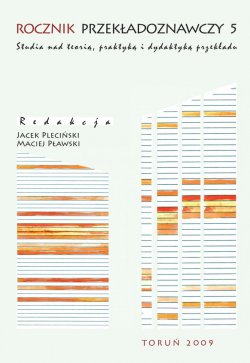Intertekstualność jako nowe (stare) wyzwanie w teorii i praktyce przekładu literackiego
DOI:
https://doi.org/10.12775/RP.2009.009Słowa kluczowe
intertekstualność, przekład literacki, kontekst kulturowy, Elfriede JelinekAbstrakt
Tematem referatu jest kwestia (nie)konieczności spożytkowania badań literaturoznawczych z zakresu intertekstualności przez translatologów, a w konsekwencji również przez praktyków przekładu literackiego. Materiałem egzemplifi kacyjnym omawianego zjawiska jest powieść austriackiej noblistki Elfriede Jelinek Wykluczeni (Die Ausgesperrten), w której wykrycie powiązań intertekstualnych jest nie tylko kluczową cechą idiolektu autorki, lecz przede wszystkim gwarantem deszyfracji intencji dzieła, a w kontekście praktyki przekładu – drogą uzyskania ekwiwalentnego przekładu względem oryginału.
Bibliografia
Balbus, S., 1996, Między stylami, Kraków.
Balcerzan, E., 1968, „Poetyka przekładu artystycznego”, [w:] Nurt, nr 8, s. 23– –26.
Bednarczyk, A., 2000, „Różnice strategii (aspekt intertekstualny w oryginale i w przekładzie literackim)”, [w:] Komparatystyka literacka a przekład, Fast, P., Żemła, K. (red.), Katowice, s. 157–172.
Danek, D., 1980, Dzieło literackie jako książka. O tytułach i spisach rzeczy w powieści, Warszawa.
De Beaugrande, R.-A., Dressler, W.U., 1990, Wstęp do lingwistyki tekstu, przeł. A. Szwedek, Warszawa.
Duszak, A., 1998, Tekst, dyskurs, komunikacja międzykulturowa, Warszawa.
Głowiński, M., 1986, „O intertekstualności”, [w:] Pamiętnik Literacki, z. 4, s. 75–100.
Jelinek, E., 1980, Die Ausgesperrten, Reinbek bei Hamburg.
Jelinek, E., 2005, Wykluczeni, przeł. A. Majkiewicz, J. Ziemska, Warszawa.
Legeżyńska, A., 1997, „Tłumacz jako drugi autor – dziś”, [w:] Przekład literacki. Teoria. Historia. Współczesność, Nowicka-Jeżowa, A., Kysz-Tomaszewska, D. (red.), Warszawa, s. 40–50.
Markiewicz, H., 1988, „Odmiany intertekstualności”, [w:] Ruch Literacki, z. 4–5.
Nycz, R., 1995, Tekstowy świat. Poststrukturalizm a wiedza a literaturze, Warszawa.
Pfister, M., 1991, „Koncepcje intertekstualności”, [w:] Pamiętnik Literacki, z. 4, s. 192–194.
Sartre, J.-P., 1960, Les sequestres d’Altona, Gallimard, Paris.
Sartre, J.-P., 1961, Więźniowie z Altony, przeł. J. Kott, [w:] Dialog, nr 5, s. 37–107.
Sartre, J.-P., 1991, Die Eingeschlossenen von Altona, tłum. T. Konig, Reinbek bei Hamburg.
Tokarz, B., 1998, Wzorzec, podobieństwo, przypominanie, Katowice.
Pobrania
Opublikowane
Numer
Dział
Statystyki
Liczba wyświetleń i pobrań: 2123
Liczba cytowań: 0



